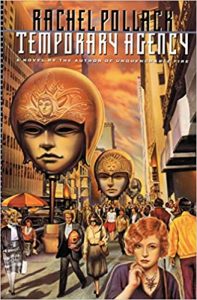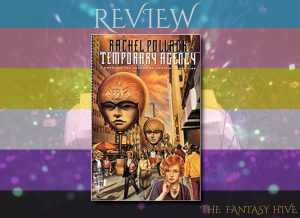TEMPORARY AGENCY by Rachel Pollack (BOOK REVIEW)
“When I was fourteen, a cousin of mine angered a Malignant One.”
Rachel Pollack’s Temporary Agency (1994) is set in the same world as her classic novel Unquenchable Fire (1988), an alternate America in which a spiritual revolution led by a group of shamans called the Founders has resulted in a world where storytellers are revered and magic is a mundane part of everyone’s life. While both novels stand alone as individual works of fiction, it’s hard to imagine reading one and not wanting to read the other. Temporary Agency allows us to spend more time in Pollack’s wonderful world, whilst, like its predecessor, showing Pollack’s incredible knack for interweaving the fantastic with sharp, character-focused writing.
 Temporary Agency is the story of Ellen Pierson, told in two parts. In the first part of the book, Ellen is a teenage girl living in New York state whose cousin Paul starts a relationship with a woman without realising that she is a Malignant One, a demonic spirit. Terrified and not knowing where to turn, he confides in his plucky kid cousin. Ellen, unlike her staid suburban parents, realises that urgent action must be taken, and convinces her family to seek out the help of a lawyer. Ellen soon finds herself working alongside her heroine, famous lawyer Alison Birkett, in an attempt to banish the Malignant One, save Paul, and discover why the Spiritual Development Agency is so reluctant to help. The second part of the book jumps forward to when Ellen is a young woman in her twenties, deeply disillusioned with Alison and the spiritual world following the fallout of Paul’s conflict with the Malignant One. Fate and circumstance throw her together with Alison again, as the two of them are drawn into an investigation to figure out why ambitious and idealistic Teller Alexander Timmerman has managed to attract the patronage of the usually reticent Benign Ones in his quest to unmask corruption in the government, and how this case is connected to Paul’s misfortunes from over a decade ago.
Temporary Agency is the story of Ellen Pierson, told in two parts. In the first part of the book, Ellen is a teenage girl living in New York state whose cousin Paul starts a relationship with a woman without realising that she is a Malignant One, a demonic spirit. Terrified and not knowing where to turn, he confides in his plucky kid cousin. Ellen, unlike her staid suburban parents, realises that urgent action must be taken, and convinces her family to seek out the help of a lawyer. Ellen soon finds herself working alongside her heroine, famous lawyer Alison Birkett, in an attempt to banish the Malignant One, save Paul, and discover why the Spiritual Development Agency is so reluctant to help. The second part of the book jumps forward to when Ellen is a young woman in her twenties, deeply disillusioned with Alison and the spiritual world following the fallout of Paul’s conflict with the Malignant One. Fate and circumstance throw her together with Alison again, as the two of them are drawn into an investigation to figure out why ambitious and idealistic Teller Alexander Timmerman has managed to attract the patronage of the usually reticent Benign Ones in his quest to unmask corruption in the government, and how this case is connected to Paul’s misfortunes from over a decade ago.
Temporary Agency explores what happens when the miraculous becomes mundane. In Pollack’s world, the spiritual is a fact of everyday life, accessible to everyone via the right rituals. However this has not stopped the bureaucracy of both organised religion and government from becoming corrupt, cynical and self-serving, perverting the spiritual truth of the Living World to their own ends. Pollack effectively contrasts the supernatural terror of being caught in the attentions of demonic or angelic beings with the callous indifference of the bureaucratic machine crushing people within its cogs. Both Paul and Alexander are essentially innocents who are unlucky enough to stand in the way of those in power’s arrangements of convenience. Ellen and Alison’s heroic attempts to hold the powerful accountable run up against the bulwark of systemic corruption. As always when the rich and powerful play games, it is everyone else who winds up paying the price. We see this in the fate of Paul, hung out to dry by the organisations in place to protect him because of the usefulness of Malignant Ones to government assassins, and in Alexander’s followers, destroyed by the sexual ecstasy created by his patron Benevolent Ones in a move by the corrupt politicians targeted by Alexander’s work to discredit him and his movement.
At its heart, though, Temporary Agency is a queer love story, as Ellen and Alison find their way to each other. In the first part of the book, Ellen’s childhood crush on Alison runs up against her disillusion at learning that Alison is a regular human being with flaws, in contrast to the heroic image Ellen has of her in her head. In the second part of the book, Ellen is an adult and is able to meet Alison as an equal, and the two are able to enter into a loving and supportive queer relationship. Pollack explores with depth and compassion how these two women’s love for each other helps them overcome their traumas. The book is told from Ellen’s perspective in first person, and Pollack does an excellent job of capturing the young Ellen’s injured innocence and contrasting it with the older Ellen’s bitter cynicism.
Temporary Agency is a worthy follow up to Unquenchable Fire, a novel that finds the human and the mundane in amongst the fantastic. For all that Pollack’s characters are operating in a world populated by divine and demonic beings, Pollack centres the human experience. As with Jennifer Mazdan’s doomed struggle against becoming the mother for a new messiah without her consent in Unquenchable Fire, Ellen, Alison, Paul and Alexander’s struggles against vast and impersonal religious and government organisations are all the more important because they represent people standing up for themselves and doing the right thing in spite of the incredible odds against them. It is this warmth and humanity that anchors Temporary Agency and makes it such a powerful and defiant novel.


[…] an alternate America transfigured by spirits and shamanism. It won the Arthur C. Clarke award. Temporary Agency (1994), set in the same world, was nominated for the Nebula Award, and the stand-alone […]